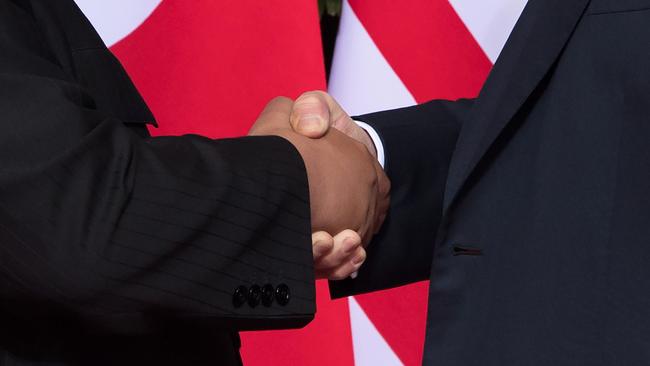
Did Donald Trump and Kim Jong-un labour mightily to bring forth a mouse?
In terms of affect, almost the chief quality in which these two leaders traffic, it was a spectacular success for both.
Certainly, win, lose or draw, this was a historic occasion. Never before had a US president and a North Korean Workers Party chairman met face to face.
The language that Trump used to describe Kim was extraordinary: “I learned he’s a very talented man, I also learned he loves his country very much.”
Trump went further to say there was now a “special bond” between him and Kim, formerly known as “little rocket man”. Kim, naturally less grandiloquent, nonetheless recorded his sincere thanks to Trump, formerly labelled by Kim as an intellectually deranged “dotard”.
Trump has moved this process along through force of rhetoric, and by the threats he made of military action against North Korea. His biggest achievement was getting China to join in very tough sanctions against North Korea. It seems these sanctions were so severe they started to affect the way the North Korean elite lived.
And yet the full text of the Trump-Kim document has all the specificity of a Hallmark card.
The big question is: where’s the beef, Jack? As a burger, it’s all garnish and no meat or buns.
The document’s only real virtue is its brevity. The US has offered security guarantees, both sides have committed to finding peace and pioneering new US-North Korea relations. Its only substance is “reaffirmation” of the joint declaration Kim made with South Korea to “complete denuclearisation” of the Korean peninsula.
Now, it should be remarked straight away, if Kim lives up to this commitment, then Trump will go down in history as a great statesman. But while we must remain open to that possibility, there is no real indication that it is likely. At least four times before, North Korea has committed to getting rid of its nukes and it has always lied, cheated, kept them and developed them further. And those agreements were all vastly more specific than this one.
Two comparisons spring to mind: if the US cannot possibly trust Iran to keep a deal that is very specific, why can it trust North Korea to keep a deal that is so vague and woolly? And the other is, how can there be “a special place in hell” for Canadian Prime Minister Justin Trudeau while Kim, just by turning up at a summit, is “a very talented” patriot who “deeply loves his country”.
Later in the day, Trump declared China’s President, Xi Jinping “a great leader of his people”, and, of course, “a friend of mine”.
Trump is right to push this process as far and as hard as it will go. But two other facts are critical. First, this summit was Kim’s initiative. Second, while not denying the rightness of Trump giving this issue such priority, it is not exactly a diplomatic achievement to get the North Koreans to a summit.

The leaders in Pyongyang, Kim’s papa and grandpapa, have wanted a summit with a US president for 30 years and more. Bill Clinton had his own historic deal with Kim’s father. The North Koreans were desperate to get Clinton to a summit.
Previous presidents didn’t give North Korea that reward. It may be that Trump has given Kim this huge reward and got nothing of substance in return. Of course, the proof of the pudding will be in the eating. How quickly do the follow-up meetings take place and what do they actually produce?
Trump is nearly halfway through his presidential term and there is nothing in this agreement that signals urgency.
The other problem with Washington’s approach is it has kept changing its goals. At first it wanted “comprehensive, verifiable, irreversible denuclearisation”. Yet this term was never mentioned at the summit nor in the agreement.
This bears more than a passing resemblance to the way Barack Obama kept diminishing the goals of his agreement with Iran.
One good thing is that Trump has not as yet removed any sanctions. Yet Trump acknowledged that Beijing was already relaxing its sanctions and border controls.
Then, almost casually, he revealed that the US would end military exercises with South Korea, which, he remarked in an astonishing concession, were “very provocative”. And, with that irreducible gracelessness that is so much a Trump trademark, he rejoiced that the US would save “a lot of money”.
Bizarrely, having previously told us that US military action against North Korea was credible, he now says it would have cost 20 million to 30 million lives, which probably means that if the North Koreans renege on the deal, the military option is no longer viable.
He said his long-term ambition was to bring US troops out of South Korea. So just how secure is this alliance? The bottom line is simple: if this all works, it’s great. So far, though, it is Kim who has achieved everything he would want: the removal of the US military threat, the easing at least of Chinese sanctions and diplomatic legitimacy his ancestors could only have dreamed of.
Trump and Kim point a way forward. You cannot know it won’t succeed, and you hope it might. Yet, in truth, we have seen this many times before. Hopefully, this time we get a different ending.








To join the conversation, please log in. Don't have an account? Register
Join the conversation, you are commenting as Logout